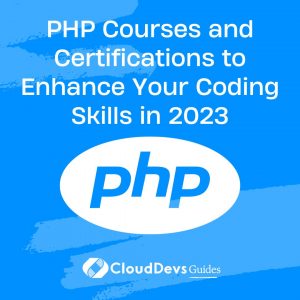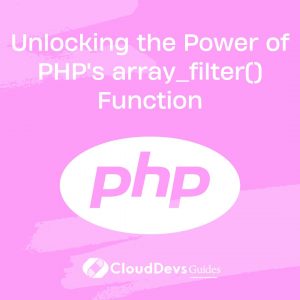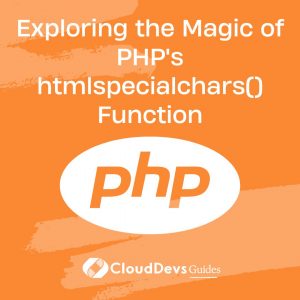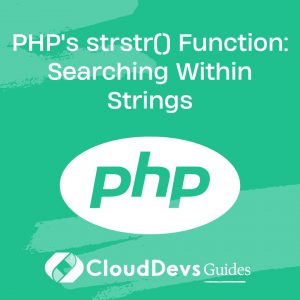PHP Courses and Certifications to Enhance Your Coding Skills in 2023
PHP has firmly established itself as a significant scripting language, meeting a diverse range of software development needs and gaining widespread adoption across enterprises of varying sizes. It provides developers with robust features for constructing applications, leading to a growing demand for skilled PHP developers.
Table of Contents
For those looking to strengthen their PHP skills or embark on a career in PHP development, considering certification programs or enrolling in relevant courses can offer significant benefits. In this article, we will explore some of the top PHP certification options and courses available in 2023.
1. PHP Tutorial for Beginners on Udemy
Getting Started With PHP For Beginners is a comprehensive PHP course on Udemy for free. This course is designed for those with little or no programming experience who are looking to learn the fundamentals of web development. It covers all the basics of PHP programming, including data types, strings, functions, and loops. The course’s creator is Abdul Waheed.
The course has only one section which has 12 individual lecture videos.
- Introduction: This is the only module topic in this lecture, and it includes a short introduction to PHP, which covers installing tools, PHP basic syntax, echo and print commands, local variables, global variables, PHP arrays, data types, and finally, Else statements. This section also includes a bonus lecture of just 34 seconds.
This course is free for anyone, and you do not receive a certificate of completion in this course.
2. PHP Essential Training on LinkedIn Learning
PHP Essential Training is a beginner-level course on LinkedIn Learning designed to teach you PHP programming from scratch. The course covers all the basics of PHP programming, including data types, strings, functions, and loops. The course also includes real-world examples and coding challenges to help you practice your new PHP programming skills. The course creator is Kevin Skoglund, and this course has 4.7 stars out of 5.
The course modules are;
- Introduction: In this section, you will be introduced to the world of PHP, laying the foundation for your exploration of this powerful scripting language.
- PHP Overview: You will explore the overview of PHP, delving into its features, and applications, and understanding its role in web development.
- Explore Data Types: In this topic, you will learn about the various data types in PHP, including strings, integers, floats, arrays, and more, to effectively manage and manipulate data.
- Control Structures: Logical Expressions: This section will teach you about logical expressions in PHP’s control structures, allowing you to make informed decisions in your code.
- Control Structures: Loops: This section will dive into PHP’s loop structures, understanding how to create efficient and dynamic code with iterations to streamline repetitive tasks.
- User-Defined Functions: You will explore the creation and utilization of user-defined functions in PHP, enhancing code modularity and reusability.
- Debug: In this topic, you will learn essential debugging techniques in PHP, ensuring the identification and resolution of issues in your code.
- Conclusion: Conclude this PHP module by summarizing key takeaways, reflecting on the covered topics, and understanding their practical application in web development.
You receive a shareable certificate from LinkedIn Learning when you finish this course successfully.
3. PHP: Get Started on PluralSight
PHP: Get Started is a beginner-level course on Pluralsight designed to teach you PHP programming from scratch. The course covers all the basics of PHP programming, including data types, strings, functions, and loops. The course also includes real-world examples and coding challenges to help you practice your new PHP programming skills. The course was created by Christain Wenz.
The course modules have four modules, and the course modules are;
- What is PHP?: In this section, you will gain a clear understanding of PHP, exploring its purpose, features, and its crucial role in web development.
- Working with Forms: You will explore the intricacies of working with forms in PHP, learning how to handle user input and create interactive and dynamic web applications.
- Working with Databases: This module will cover the databases in PHP, understanding how to connect, query, and manipulate data, enabling the creation of dynamic and data-driven websites.
- Conclusion: This section will conclude this PHP module by summarizing key insights, reflecting on the practical applications of PHP in web development, and understanding the significance of the covered topics.
This course is suitable for PHP beginners, and intermediate developers, and upon successful completion, you can receive a certificate.
4. PHP CodeIgniter: Learn CodeIgniter on Eduonix
PHP CodeIgniter: Learn CodeIgniter is a course offered by Eduonix that teaches you how to build PHP web applications using the CodeIgniter PHP framework. The course is designed for beginners and intermediate-level programmers who want to learn PHP programming from scratch. It covers all the basics of PHP programming, including data types, strings, functions, and loops. The course also includes real-world examples and coding challenges to help you practice your new PHP programming skills.
The course modules are;
- Setting Up: You will learn the essential steps of setting up your PHP environment, laying the groundwork for successful project development.
- Project Creating the First Sections: This section will explore the process of creating the initial sections of your project in PHP, understanding the structural foundation of your application.
- Creating Our First Model: This module will delve into how to create your first model in PHP, establishing the data structure that will drive your application’s functionality.
- Logging a User In: You will learn how to implement user authentication, allowing users to log in securely to your PHP-based application.
- Registering Users: You will learn the process of registering users in PHP, creating a seamless and secure user registration system for your project.
- Refactoring to an API and Getting JavaScript Buck-Wild: This section will explore the refactoring process to create an API, enabling dynamic interactions, and unleashing the power of JavaScript in your PHP project.
- JavaScript Structure: You will learn how to advance the structure of your JavaScript code, optimizing its organization and functionality.
- Creating a Reusable CRUD Model: This module will delve into understanding the creation of a reusable CRUD (Create, Read, Update, Delete) model in PHP, streamlining database interactions for various entities.
- Creating Notes: You will learn how to implement note creation functionality in PHP, enhancing the interactivity and usefulness of your application.
- Appearance: Twitter Bootcamp: This section will explore the integration of Twitter Bootcamp to enhance the appearance of your PHP project, creating a visually appealing and responsive user interface.
You can receive a shareable certificate by completing this course successfully.
5. PHP with Laravel for Beginners – Become a Master in Laravel on Udemy
PHP with Laravel for beginners – Become a Master in Laravel’ is a complete PHP programming certificate course on Udemy. The course is designed for beginners who want to learn PHP with Laravel, a popular PHP framework. The course covers the basics of PHP programming and the Laravel framework.
This course includes 52 individual course modules and a few of them are;
- The First Steps: You will learn the initial steps of PHP development, setting the foundation for your coding journey.
- Windows – Local Environment Setup: This section will explore the process of setting up a local development environment for PHP on Windows, ensuring a smooth and efficient coding experience.
- MAC – Local Environment Setup: This section will explore how to set up a local PHP development environment on a Mac, providing insights into the platform-specific considerations.
- Laravel Fundamentals – Routes: You will learn the fundamentals of Laravel by understanding routes, a crucial aspect of defining the URLs and actions in your PHP application.
- Laravel Fundamentals – Controllers: You will learn the essentials of controllers in Laravel, gaining proficiency in organizing and managing the logic of your PHP application.
- Laravel Fundamentals – Views: You will learn about Laravel views, an integral part of PHP development, allowing you to create dynamic and interactive user interfaces.
- Laravel Fundamentals – Laravel Blade Templating: This module will delve into Laravel Blade templating, enhancing your ability to create elegant and efficient PHP views.
- Database – Eloquent One-to-One Relationship CRUD: You will learn how to perform CRUD (Create, Read, Update, Delete) operations in PHP using Eloquent, specifically focusing on one-to-one relationships in databases.
- Database – Eloquent One-to-Many Relationship CRUD: You will learn about CRUD operations in PHP with Eloquent, emphasizing one-to-many relationships in database structures.
- Database – Eloquent Many-to-Many Relationship CRUD: You will learn how to execute CRUD operations in PHP using Eloquent, with a focus on many-to-many relationships in databases.
- Database – Eloquent Polymorphic Relationship CRUD: You will learn about CRUD operations in PHP with Eloquent, concentrating on polymorphic relationships in database modeling.
- Database – Eloquent Polymorphic Many-to-Many Relationship CRUD: You will learn how to perform CRUD operations in PHP using Eloquent, specifically addressing polymorphic many-to-many relationships in databases.
- Forms and Validation: This section will explore the process of creating forms and implementing validation in PHP, ensuring secure and user-friendly interactions.
- Forms – Package and Validation: This section will explore the use of packages and validation techniques in PHP forms, enhancing the functionality and reliability of your web applications.
- Forms Uploading Files: You will learn how to handle file uploads in PHP forms, expanding your capability to manage diverse data types in web applications.
After completing all 52 modules, and submitting the final assignment, you will be able to receive a sharable certificate certified by Udemy.
Here, we have added a comparison table for the PHP courses mentioned above in this article.
| Course/ program | Cost | Level | Duration | Study mode |
|---|---|---|---|---|
| PHP Tutorial for Beginners | Free | Beginner | 1 hour 24 minutes | Online |
| PHP Essential Training | $29.99 | Beginner | 4 hours 4 minutes | Online |
| PHP: Get Started | Free | Beginner / Intermediate | 3 hours 15 minutes | Online |
| PHP CodeIgniter: Learn CodeIgniter | $12 | Intermediate | 7 hours | Online |
| PHP with Laravel for beginners - Become a Master in Laravel | $74.99 | Intermediate / Advanced | 43 hours | Online |
The provided table outlines distinctions among PHP courses, covering duration, costs, and prerequisite skills. Course fees vary based on factors like the learning platform, study format, and duration. When choosing a PHP certification course, it is crucial to evaluate its alignment with your skills, financial constraints, and career goals.
6. Conclusion
In summary, enrolling in a PHP course in 2023 presents a valuable opportunity for career advancement. With adequate training, you can refine your skills as a PHP developer, participating in stimulating projects. Whether you are a beginner PHP programmer or a seasoned PHP professional, there are diverse courses and certification programs available to enhance your proficiency in PHP development.
Table of Contents








